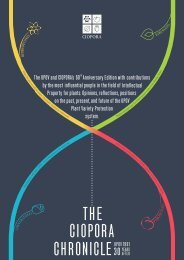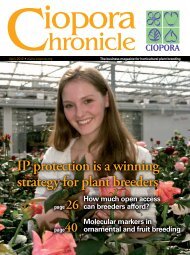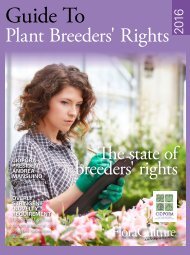CIOPORA Chronicle 2015
2015 CIOPORA annual magazine on Intellectual Property protection for plant innovations. The edition issue was produced in cooperation with FloraCulture International. Read in the 2015 issue: - From the President: The world is changing - Should PBR influence the minimum distances between varieties? - U.S. plant patent protection & public use - Is border detention in the Netherlands an effective enforcement tool for breeders? - From Secretary General: Securing another piece of the puzzle - Gen Y consumers: flower purchasing behavior and social media - The superlative of miniature: a brand new small world and more...
2015 CIOPORA annual magazine on Intellectual Property protection for plant innovations. The edition issue was produced in cooperation with FloraCulture International.
Read in the 2015 issue:
- From the President: The world is changing
- Should PBR influence the minimum distances between varieties?
- U.S. plant patent protection & public use
- Is border detention in the Netherlands an effective enforcement tool for breeders?
- From Secretary General: Securing another piece of the puzzle
- Gen Y consumers: flower purchasing behavior and social media
- The superlative of miniature: a brand new small world
and more...
Create successful ePaper yourself
Turn your PDF publications into a flip-book with our unique Google optimized e-Paper software.
information provided to customs
authorities in the application form.
As most breeders have a licensing
network of propagators, growers
and traders, and as the parties
in this network closely monitor
infringing activities, breeders are
generally able to provide customs
authorities with detailed and
accurate information about both
authorized and infringing products
(in some cases even the name of a
vessel or arrival time of a shipment).
The more accurate the provided
information is, the higher the
chance of the detention action
success.
Limited time to assess
infringement
The APR provides for a specific
regime for perishable goods 6 . In
respect of such goods, the term to
respond to the customs notification
and the term to initiate legal
proceedings is only three working
days from the notification of the
detention. Because of the short
and overlapping terms, this can
lead to practical problems when
the holder of the goods withholds
his objection until the end of the
In 2013, the EU customs authorities
detained almost 36 million items
suspected of infringing Intellectual
Property Rights (“IPR”).
three working day term, which
coincides with the end of the term
during which the IPR holder is
required to initiate legal action to
prohibit the release of the detained
goods. To ensure that the alleged
infringing goods are released, the
breeder can ask a civil court to
appoint a pre-judgement seizure
to preserve evidence immediately
after detention notification.
Inspection ‘on the spot’
The Dutch customs authorities do
not always possess the necessary
information to assess if the goods
are infringing any PVR or other
IPR. In practice, immediately
after detention, the IPR holder is
given an opportunity to have a
technical or legal expert analyze
the goods at the terminal. This
means that the IPR holder needs
to have a legal and technical
expert present in the jurisdiction
where border detention measures
are taken. Only in case of
counterfeit and pirated goods,
samples can be provided to the
IPR holder for further analysis. In
order to obtain samples of goods,
the breeder can aks a civil court
to issue an evidentiary seizure. It
is noted that under Dutch law,
separate proceedings will have to
be initiated to obtain access to
material seized pursuant to such
evidentiary seizure leave.
Risk
Finally, border detention of goods
can also present a risk to the IPR
holder. The IPR holder is required
to reimburse the customs for all
the costs which arise from the detention
measures and then claim
for compensation of such costs
from the infringer. Furthermore,
if the customs proceedings are discontinued
due to an act or omission
of the IPR holder, samples are
not returned timely or damaged,
or the goods are determined to
be legal, the IPR holder will be
held liable for damages suffered
by the holder of the goods. In
this respect it is noted that in The
Netherlands, the cost of the legal
proceedings in IPR infringement
cases is carried by the losing party.
Conclusion
The border detention measures,
particularly in combination with
civil measures, can serve as an effective
tool for PVR enforcement
in the Netherlands. However, a
breeder who is considering to file
a request for action by the Dutch
Customs Authorities should be
well prepared. In order to be able
to act quickly, breeders should
have technical and legal experts
available in the jurisdiction where
such measures are to take place. |||
1 Results on customs enforcement
of Intellectual Property rights,
results at the EU border 2013,
Publication Office of the
European Union 2014, p. 21. The
statistics over 2014 were not
yet published at the date of this
publication.
2 Regulation (EU) No 608/2013 of
the European Parliament and
of the Council of 12 June 2013,
concerning customs enforcement
of intellectual property rights and
repealing Council Regulation (EC)
No 1383/2003.
3 European Court of Justice, 1
December 2011, cases Nokia (C-
495/09) and Philips, (C-446/09). It
is noted that in legal proceedings,
the IPR holder will have to
evidence that there is a treat that
the goods will be put on the EU
market.
4 ‘Counterfeit goods’ are defined
in the APR as goods which are
the subject of (certain types
of) trademark infringement and
infringement of geographical
indications as further defined
in the APR. Furthermore, such
goods comprise packaging,
label sticker etc. infringing
a trademark or geographical
indication. 'Pirated goods’ means
goods that infringe a copyright or
a design right.
5 The IPR holder is, however, not
entitled to use this information
for other purposes than those
specified in article 21 of the APR,
including inter alia initiating
legal proceedings to determine
whether an IPR has been
infringed.
6 ‘Perishable goods’ are defined
in the APR as “goods considered
by customs authorities to
deteriorate by being kept for
up to 20 days from the date of
their suspension of release of
detention”.
About the author
Fleur Tuinzing-Westerhuis works as an IP lawyer at Houthoff Buruma,
one of the largest law firms in The Netherlands. Fleur specializes in
IP matters, with a focus on patents and plant variety rights. Fleur has
extensive experience in both patent litigation and litigation relating to
national and Community plant variety rights. In her daily practice, Fleur
represents domestic and international breeding companies that are
active in the Horticulture and Agrifood sectors. Over the past 10 years,
Fleur has litigated in various cases before the Dutch Courts, the Dutch
Board of Plant Varieties and the Office for Harmonization in the Internal
Market. Furthermore, Fleur assists clients in implementing customs
seizure actions based on the EU Anti-Piracy Regulation and advises on
license agreements.
CIOPORA Chronicle June 2015 | www.FloraCulture.eu 19









